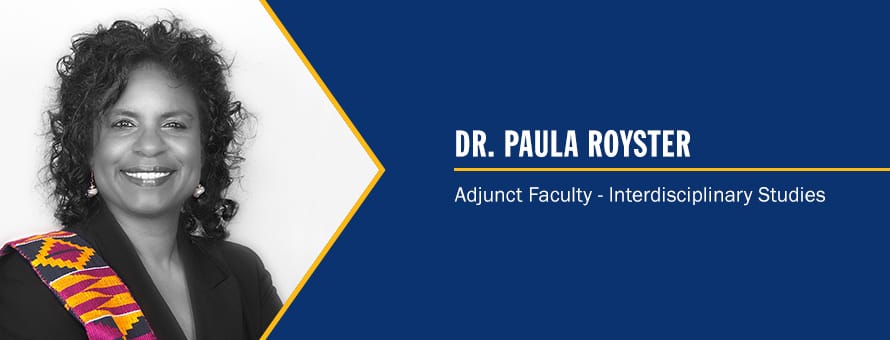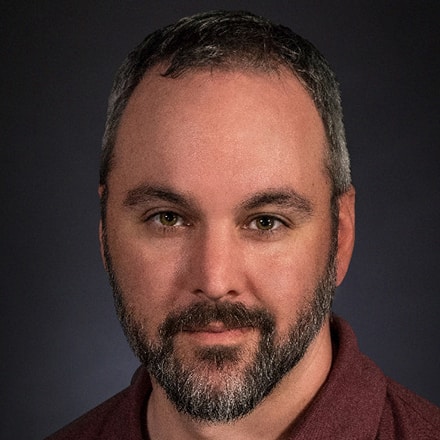Interdisciplinary Studies Faculty Dr. Paula Royster: A Q&A

An expert on the history and culture of the African diaspora and former Fulbright Scholar, Dr. Paula Royster teaches interdisciplinary studies at Southern New Hampshire University. She shared her thoughts on teaching, education and more as part of SNHU's Faculty Spotlight Series.
Tell us a little bit about your professional background?
I have been an active scholar-practitioner, educator and founder and CEO of The Center for African American Genealogical Research, Inc. (CAAGRI). I graduated from Union Institute and University with an interdisciplinary doctorate degree majoring in humanities and culture, with a secondary major in public policy and social justice and a certificate in creative writing and an interdisciplinary master's in history and culture also from Union Institute and University. My disciplines are history, cultural anthropology and cultural studies.
I have researched on every continent except Australia, tracing the history of the African Diaspora and the contributions enslaved societies have made to industrialized nations. I recently published “I.AM.ARAPI: The Journey of Akan Israelites in the Islamic Slave Trade” and am currently under contract to publish the research methodologies I used to write “I.AM.ARAPI.”
In addition to being on the roster of the U.S. Department of State Diversity Speaker’s Bureau, I have served two years as a peer-reviewer for the Fulbright Commission, and I am an active member of two Working Group of Experts (WGE) that focus on women empowerment and racial healing. I regularly participate in professional conferences, public speaking engagements, and have won numerous awards for my scholarship.
Over the past one and a half years at SNHU, I have taught both IDS-100 and IDS-400 level courses. Prior to SNHU and excluding my Fulbright assignments, I was an adjunct for the University of Mary Washington in Fredericksburg, Virginia.
What led you to academics, and in particular, SNHU?
I was recruited by a local university to work with college-ready students. I did that for nearly 10 years. I was not sure how that would work, but my sister has been teaching for 28 years, so (she) gave me some pointers for in classroom instruction. I have been teaching ever since.
SNHU was one of a handful of schools that actually has an undergraduate interdisciplinary studies department, which fits well with my interdisciplinary background. It was a perfect fit.
What drew you to this field of study? What keeps you excited about it?
I love history and learning about how other cultures view life and solve problems. I also know that we only know the stories of about one-sixth of the world’s population, which means that there is so much more that we don’t know about the world. What I have found in my travels is that everyone wants security (food, water, personal); everyone wants to move around freely; everyone is willing to work; and everyone wants to age with grace and dignity – these are the things that are common human wants regardless of language, or the zip code we live in. We can start with the basics to build a better human experience for every human being.
What do you find rewarding in your position as an online instructor?
What is most rewarding is the end of the semester, when students will send me an email, leave a note in the comments section of the final project, write a statement on the discussion board, or leave feedback in my evaluation with specific moments that mattered to them. Words are powerful, and they matter. Words have always mattered.
Can you think of a particularly impactful or eye-opening moment as an educator?
I think the most eye-opening moments I continue to have is the battle with information literacy (READ: Social Media’s disinformation, Wikipedia’s fast, easy answers, and acronyms i.e., Lol, BTW, etc.). I realized that it is not just young people who are appended to the internet. I see it as a crisis of the highest order.
What advice do you have for students interested in studying online?
I would first advise potential students that Team SNHU is committed to ensuring that they receive a quality education delivered by caring faculty, advisors and staff.
As a practical matter, I would encourage potential students to analyze their availability before committing to a full course load. Obtaining an undergraduate degree is a serious financial investment, so an honest assessment of time (i.e., work, family, school) is critical to earning good grades and, thus a pleasurable experience. Perhaps taking one course rather than a full load just to get acclimated to the nuances of an online environment might be good for anyone who is undecided.
How have you found ways to effectively connect with students online?
Yes, most of the time, and it really does depend on the student. Some are very driven by process to get in and out and do not want to engage in conversations.
You were recognized as a Fulbright Scholar in 2011 and again in 2016 - what does that accomplishment mean to you?
Anyone who has ever received a Fulbright Award is acutely aware of the privilege of being selected to represent the U.S as a Cultural Ambassador, so from that perspective, it continues to be an honor personally and professionally. Also, the Fulbright Commission’s validation of my research projects as meaningful and substantive was huge affirmation of the cultural value I intended to add to the communities I served in.
What did you do during your time as a Fulbright Scholar? How has that time added to your professional and personal experience?
I was requested by the U.S. Embassy in Kingston to visit Jamaica for the purposes of advocating for the need to have an African Studies program at the University of West Indies at Mona. Both students and teachers had been trying to convince the university’s administration that the topic was relevant to their national identity, but the administration did not see the value of such studies. My tasks were to elucidate my research findings that explained how Jamaica became heir to the Jonkanoo by identifying the person who transferred the tradition called "Kundum" in Prince’s Town, Ghana circa 1724. I was also tasked to work with faculty on developing a curriculum that was on par with what we would expect students in the U.S. to know about African Studies. I gave numerous presentations and engaged in public speaking events, radio and newspaper interviews, and guest lectures at four universities.
My Fulbright to Paramaribo was a teaching and research award. I developed the curriculum for an African Diaspora studies course as well as a research methodologies course for undergraduate students. I gave public presentations and conducted two short master classes on visual cultural production. My research topic was on the Akans in Suriname as a follow-on to my research projects in Jamaica and Ghana.
What do you enjoy doing when you’re not working?
When I have “free” time, I love to work in my garden, read (No Sci-Fi—I’m too scared for that!), paint ceramics, travel, and binge watch “The Haves and Have Nots.”
What is one (or two) books every college student should read?
Given that we are living through a precarious season in world history, I would recommend “Decolonizing Methodologies Research and Indigenous Peoples” by Linda Tuhiwai Smith because she does a wonderful job of laying the groundwork for how we should approach all scholarship and how we should consider other voices hidden in plain view when we draw our own conclusions. It is a very compelling book.
Why is education important to society as well as to you personally?
Now, more than ever, it is important to have generations of an educated population. We need more people who have the critical analysis skills to sift through information to make truly informed decisions, to improve technology and medicines, to protect our environment, and to participate, unimpeded, in the voting process. Educated people have a responsibility to share their knowledge and experiences, and to advocate for people who do not have a college education if we are going to improve the lot of every human being.
My personal view is that if we do not have an educated population, our sovereignty as a nation will depend on other countries.
Joe Cote is a staff writer at Southern New Hampshire University. Follow him on Twitter @JoeCo2323.
Explore more content like this article

What Can You Do With an English Degree?

Academic Spotlight: Dr. Christopher Lee, Associate Dean of English Programs

SNHU Spotlight: Ashley Smith, BA in Communication Grad
About Southern New Hampshire University

SNHU is a nonprofit, accredited university with a mission to make high-quality education more accessible and affordable for everyone.
Founded in 1932, and online since 1995, we’ve helped countless students reach their goals with flexible, career-focused programs. Our 300-acre campus in Manchester, NH is home to over 3,000 students, and we serve over 135,000 students online. Visit our about SNHU page to learn more about our mission, accreditations, leadership team, national recognitions and awards.


